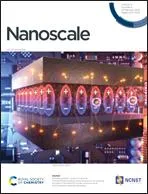Solution processed flexible and bending durable heterojunction colloidal quantum dot solar cell
文献信息
Xiaoliang Zhang, Jindan Zhang, Jianhua Liu, Erik M. J. Johansson
A flexible hybrid heterojunction PbS colloidal quantum dot solar cell, where the photoactive layers are deposited using a solution processed fabrication approach under ambient condition and at room temperature is presented. The bending stability of the obtained solar cell is evaluated. The results show that the solar cell exhibits high bending stability and even under the bent state the cell also maintains a high performance, which shows the potential of the quantum dot solar cell toward a lightweight, bendable power source with many possible applications.
相关文献
IF 6.843
Catalytic depolymerization of alkali lignin in ionic liquids on Pt-supported La2O3–SO42−/ZrO2 catalystsIF 6.367
Inside back coverIF 6.222
Surface structure-dependent electrocatalytic reduction of CO2 to C1 products on SnO2 catalystsIF 6.367
Small size yet big action: a simple sulfate anion templated a discrete 78-nuclearity silver sulfur nanocluster with a multishell structureIF 6.222
Strong circularly polarized luminescence of an octahedral chromium(iii) complexIF 6.222
Cu2ZnSnS4 nanocrystals for microwave thermal and microwave dynamic combination tumor therapyIF 6.222
Milk exosomes with enhanced mucus penetrability for oral delivery of siRNAIF 6.843
Catalytic depolymerization of Kraft lignin to produce liquid fuels via Ni–Sn metal oxide catalystsIF 6.367
Chemoproteomics-based target profiling of sinomenine reveals multiple protein regulators of inflammationIF 6.222
来源期刊
Nanoscale

Nanoscale is a high-impact international journal, publishing high-quality research across nanoscience and nanotechnology. Nanoscale publishes a full mix of research articles on experimental and theoretical work, including reviews, communications, and full papers. Highly interdisciplinary, Nanoscale appeals to scientists, researchers and professionals interested in nanoscience and nanotechnology, quantum materials and quantum technology, including the areas of physics, chemistry, biology, medicine, materials, energy/environment, information technology, detection science, healthcare and drug discovery, and electronics. For publication in Nanoscale, papers must report high-quality reproducible new work that will be of significant general interest to the journal's wide international readership. Nanoscale is a collaborative venture between the Royal Society of Chemistry Publishing and a leading nanoscience research centre, the National Center for Nanoscience and Technology (NCNST) in Beijing, China. image block The journal publishes weekly issues, complementing and building on the nano content already published across the Royal Society of Chemistry Publishing journal portfolio. Since its launch in late 2009, Nanoscale has established itself as a platform for high-quality, cross-community research that bridges the various disciplines involved with nanoscience and nanotechnology, publishing important research from leading international research groups.
推荐供应商
 上海芯上工业科技有限公司
上海芯上工业科技有限公司 凯诺科(泰州)药物研发有限公司
凯诺科(泰州)药物研发有限公司 湖南省岳阳市云溪区道仁矶溶剂化
湖南省岳阳市云溪区道仁矶溶剂化 广州旭帆贸易有限公司
广州旭帆贸易有限公司 弗里德里希·德索恩 GmbH
弗里德里希·德索恩 GmbH 斯百全化学(上海)有限公司
斯百全化学(上海)有限公司 上海赫诗特化工有限公司(赫特国
上海赫诗特化工有限公司(赫特国 深圳德诺龙邦新材料有限公司
深圳德诺龙邦新材料有限公司 江苏弘惠医药有限公司
江苏弘惠医药有限公司 陕西缔都医药化工有限公司
陕西缔都医药化工有限公司














